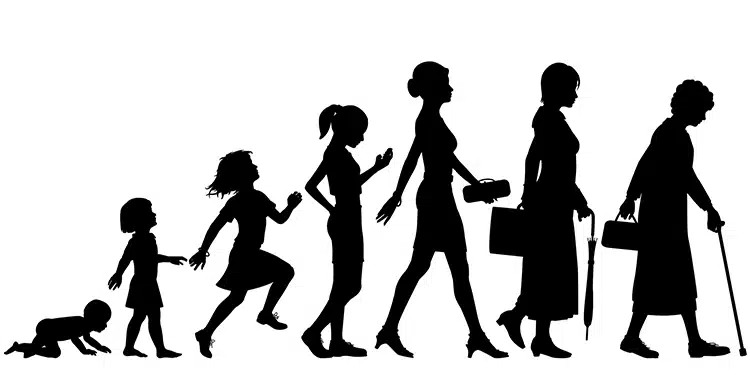
Photo: IMTMPHOTO/Depositphotos
Aging is difficult, both emotionally and physically. Knuckles may develop arthritis in the joints, while hair turns grays and wrinkles crowd the corners of our eyes. Eventually, cognitive function may slow as the body, too, is no longer able to do what was once easy. Everyone deals with aging in different ways, sometimes accepting and sometimes fighting the tides of time. But scientists are still learning a lot about the process of human aging which can help improve health outcomes at all phases of life. A new study, published in Nature Aging, has recently revealed that the process of aging is not linear but rather has powerful accelerated periods around certain ages, particularly 44 and 60 years old.
Most would assume that each year older would equate to our bodies aging and changing one year’s-worth more. However, certain periods bring on dramatic changes. The study followed 108 volunteers who every few months for months or years let researchers analyze the products of their body. Stool, blood, nasal, skin, and oral samples were taken. The researchers then assessed these samples for 135,000 types of molecules and microbes contained within or on the samples. Changes in the levels of a molecule like RNA or the presence of a bacteria can tell them about how our bodies react to aging.
Large shifts in the molecules and microbes studied indicated periods of more intense aging change. The first occurred around age 44, the second at about 60. As the study only examined ages 25 to 75, the period after 75 remains less certain, but prior studies have suggested 78 may also be an intense age. Initially, the researchers thought the dramatic changes around 44 were perimenopausal and that women accounted for this data. However, men show significant shifts as well.
While there may be other factors such as changing behaviors in middle age which affect the data, it clearly is a time of intense aging. Similarly, after 60, risk greatly rises for certain conditions such as cardiovascular conditions. The body after 44 is less able to process alcohol. And after 60, metabolism drops significantly.
“We’re not just changing gradually over time. There are some really dramatic changes,” paper author Michael Snyder of the Center for Genomics and Personalized Medicine at Stanford University said. “It turns out the mid-40s is a time of dramatic change, as is the early 60s—and that’s true no matter what class of molecules you look at.”
A recent study took a look at how the human body ages and found that rather than linearly, it seems we age in bursts.

Photo: ALEBLOSHKA/Depositphotos
From 25 to 75, our major aging events occur around 44 and 60 years of age.

Photo: TAWNG/Depositphotos
h/t: [The Guardian]
Related Articles:
Experts Say People Are Washing This One Body Part They Actually Don’t Need To
Study Shows That Venting Doesn’t Work To Blow off Steam, but There Are Other Solutions
Titanium Heart Successfully Implanted Into Human for the First Time
How Often You Should Wash Your Office Coffee Mug May Surprise You
